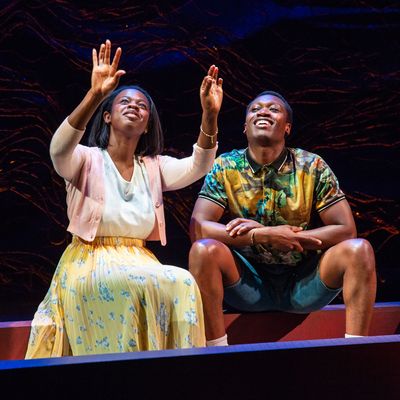
The premise of Chris Urch’s The Rolling Stone is real and horrible: In 2010, a Ugandan newpaper called Rolling Stone grabbed global attention by publishing names, the addresses, and photos of people suspected of being gay. “100 Pictures of Uganda’s Top Homos Leak,” read the headline, with the words “Hang Them” close by. It was the paper’s first edition, the ensuing violence its only real purpose. Dozens of people were physically and brutally attacked. After his gay-rights organization succeeded in a lawsuit to shut the paper down, the activist David Kato was murdered in his home with a hammer. Urch, who trained as an actor in London, sets his second full-length play during the tabloid’s reign of terror, following the trials of a young man called Dembe (Ato Blankson-Wood), who’s torn between the lover he’s hiding (Robert Gilbert), and the family, especially the pastor brother (James Udom), he feels tied to. It’s the kind of material that makes for a lot of big feelings and climactic confrontations — and while director Saheem Ali has assembled a committed company of actors, with particularly effective performances from Udom and Blankson-Wood, he can’t mask the contrivance of the script. Urch is interested in providing his characters with meaty, melodramatic speeches, but despite the actors’ fire and sincerity, too many of the notes he strikes ring stilted and false.
“You can’t put a stopwatch on grief,” Dembe snaps at Sam (Gilbert), the half-Ugandan, Northern Irish doctor he’s falling for. “And you can’t keep living with ghosts,” Sam replies. This is how much of The Rolling Stone’s dialogue progresses: as a series of platitudes, delivered as if they’re hard-hitting new thoughts. There are also the faux-poetic devices, as when Dembe and his smart, frustrated younger sister Wummie (Latoya Edwards), get swept up in a heightened and heavy-handed symbolic memory sequence about racing to climb a tree as youngsters — or when they unsubtly weave their way into talking about their dead father by playing a game where they assign imagined identities of the deceased to clouds. “Circus clown … clinical depression … she set herself on fire,” says Wummie, hypothesizing a previous life for one cloud, before they switch to another and Dembe’s face darkens as they ping-pong their way through a pile of exposition: “Lawyer… Fifty-four … Widower … Devout,” offers Wummie. “Workaholic … Sharp tongue … Taskmaster,” Dembe snaps back.
These moments (and plenty of others — try the one where Sam, in the midst of a high-stakes argument, launches into a well-phrased list of all the cute eccentricities he loves about Dembe) smack of writerly artifice. In the pursuit of cleverness, Urch repeatedly lands in cliché. Seemingly in response, as if he senses the text’s persistent sluggishness, Ali pitches everything way up. He pushes the tempo — often keeping characters moving in restless circles on Arnulfo Maldonado’s bare, clay-colored thrust stage — and elicits big, fast, borderline overblown performances from his actors. His direction attempts to muscle through the play’s clunkers and its logical gaps, encouraging us instead simply to ride along with the sweep of its emotions.
But the road remains a bumpy one, and Ali’s cast feels unevenly at home in the effortful playing style. Gilbert is good-natured if strained as Sam, the privileged, areligious Westerner who, for all his affection and smarts, can’t wrap his head around either the depth of Dembe’s faith or the scope of the threat they both face. Blankson-Wood, for the most part, manages to find his own subtlety and natural crescendos, and Udom is forceful without feeling too forced as Dembe’s older brother, Joe, a zealous young pastor twisted into the cruelest version of himself by pressures of family and society. But his climactic ranted sermon on the evils of homosexuality is just too much too late — it deadens rather than provokes. Similarly, Myra Lucretia Taylor makes the most of Mama, the siblings’ Jesus-praising busybody neighbor, though she can’t escape the wonky arc Urch has written for her. She’s got to march her way through the most melodramatic of the play’s revelations, one that refashions her character at the last minute without really making sense of her actions. By contrast, Adenike Thomas — playing Mama’s daughter, the mysteriously silent Naome — cuts through some of the bluster simply by listening. Though her post-traumatic speechlessness is itself yet another of Urch’s devices, Thomas’s quiet attention is refreshing amid the hubbub.
We have, it seems, infinite patience for plays like The Rolling Stone: earnest, intense dramas about injustice that appeal to our moral centers without making many demands on us as audience members. Ferocity of content rarely survives laziness of form, and the result is that matters of great pitch and moment start to feel familiar and consumable. Cliché is where true urgency goes to die, and it’s what keeps Urch’s play, for all the efforts of Ali and his actors, from gaining authentic momentum.
The Rolling Stone is at the Mitzi E. Newhouse Theater at Lincoln Center through August 25.





